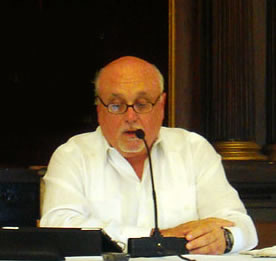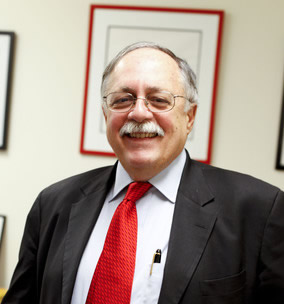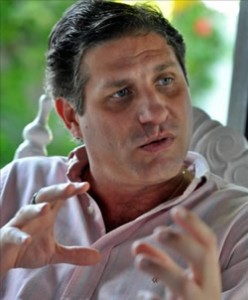
Cuba-U.S.: Is it time for dialogue?
The European Union is reviewing its policy toward Cuba and soon will open a dialogue with island authorities to establish a new framework for relations, according to EU authorities.
Recently, in November, 188 of 193 countries represented at the United Nations voted for the 22nd time for a lifting of the U.S. blockade against Cuba.
In Havana more than 30 heads of state from Latin America and the Caribbean are meeting at the Second Summit of the Community of Latin American States and the Caribbean (CELAC) in what constitutes another expression of support by the hemispheric community toward Cuba, and an acknowledgment of its sovereignty.
Those are multiple signals, but Washington seems not to go beyond public statements other than Obama’s call to be creative and update U.S. policy toward Cuba. We are still waiting for an actual change.
We at Progreso Weekly are inquiring among political analysts for their opinion at this junction of the situation. We have asked all of them: Do you believe that a dialogue between the two governments is necessary?
Mavis Anderson, member of the staff of the Latin American Working Group (LAWG)
Dialogue is the only path that will lead the United States and Cuba out of the morass in which they have been mired for more than 50 years. There are innumerable and important issues of common concern that could be addressed by sitting down and talking with one another at the highest levels of government. Our two nations have proven that it is possible, by holding respectful and productive dialogue on technical issues, like migration, postal service, drug interdiction, and others. Let’s move forward and extend those negotiations to solving the major issues between our two countries — and let’s move forward, too, toward normalization of relations. It is possible.
 José Pertierra, Cuban-American attorney living in Washington, D.C.
José Pertierra, Cuban-American attorney living in Washington, D.C.
Washington’s policy toward Cuba is a relic of the Cold War. It was imposed in 1960 by the U.S. government to cause hunger among the Cuban population with the aim of overthrowing the government. That was the time when “the domino theory” prevailed. Washington thought that the Cuban Revolution would drag the rest of Latin America toward Soviet communism, so it had to be crushed. It is a theory that has been discredited by historical events.
That state policy is anachronistic today. It is held up by the inertia of Washington politicking. But if you talk to U.S. officials about the blockade, they confess that it is time to turn the page over and normalize relations between the two countries. What happens is that, to Washington, Cuba is not a priority.
The alleged “Cuban-American lobby” is not responsible for U.S. policy toward Cuba. The power of the petty little groups in Miami is a myth. The truth is that they profit economically from the “regime change” industry.
It is a multimillion-dollar industry in Miami because almost all of the millions of dollars that Washington has budgeted [for regime change] stay in Miami — distributed among the many little groups of Cuban-Americans who are committed more to the money they receive from Washington than to the policy they defend. They are dinosaurs who died years ago but still don’t know it.
The truth is that most Americans and Cuban-Americans aspire to a normal relationship between the two countries. They want to visit Cuba, get to know the Cubans, learn a bit more about the Cuban culture that vibrates on the island, exchange ideas, dialogue, go to an Ivette Cepeda concert at the Telégrafo Hotel, to Kcho’s studio in Romerillo, to the University of Havana, to listen to Frank Delgado at El Sauce, or simply sip coffee at the Plaza Vieja. A relation as normal as the one the U.S. maintains with Mexico, Argentina, Brazil, Spain — or with Vietnam. That is why so many people travel daily on charter planes from Miami to José Martí Airport.
A premise that impedes the possibility that the U.S. government establish relations with Cuba is the assumption that Washington must negotiate the lifting of the blockade with the “carrot-and-the-stick” approach — the idea that Cuba must give in and make concessions of national sovereignty to Washington in exchange for normalization. Cuba has never negotiated in that manner and never will. National sovereignty is not negotiable. Just as Washington imposed the blockade against Cuba unilaterally, so it has to lift it without interfering in the island’s internal affairs. Cuba belongs not to Washington but to the Cubans.
Another obstacle to the lifting of the blockade are the prisoners. A necessary condition for the normalization of relations is that Cuba release the American prisoner Alan Gross, but also that the United States release Gerardo Hernández, Ramón Labaniño, and Tony Guerrero. After serving more than 15 years in prison, Fernando González will be released in late February, without any clemency from the U.S. government. Gerardo is serving two life terms plus 15 years. Unless the president of the United States takes a step in this situation, Gerardo will have to die twice until he can leave the maximum-security prison where he has been held for more than 15 years.
President Obama does not need to ask Congress and the little groups in Miami for permission to release Gerardo, Ramón and Tony. The U.S. Constitution authorizes the president to grant them executive clemency and free them with a stroke of the pen. I am sure that that gesture would be immediately reciprocated by Havana and Mr. Gross could immediately reunite with his wife, Judy, and family in Washington.
The whole world rejects the U.S. blockade against Cuba. Last October, 188 countries at the United Nations voted in favor of a resolution asking the United States to lift the blockade. Only the U.S. and Israel voted against it. During the latest Summit of the Americas in 2012, the presidents of Colombia, Brazil, Argentina, Bolivia and others declared that that would be the last summit if Cuba is not invited. Ironically, the American policy of isolating Cuba has ended up isolating the United States itself.
President Obama has the power to achieve the release of the prisoners through a tit-for-tat policy and this is the best time to do it. He is the president of the United States. Let’s hope he lives up to his office and abandons the policy of hostility toward the Cuban people and — with the aid of Congress — makes the normalization of relations between the two countries one of his legacies. It is what Americans themselves want and what Cubans of good will wish, on both shores of the Straits of Florida.
Carlos Saladrigas, businessman and head of the Cuba Study Group
Without a dialogue, no solutions can be found. It seems to me that there is a willingness on the part of President Obama’s administration to try to broaden the paths of dialogue with Cuba, but that road is strewn with fears and political dangers for both governments, many of which are not without basis, when you consider the record of relations (or lack thereof) between both countries.
The fact that the EU has acted as it has regarding its stance toward Cuba is a recognition that Cuba is at a critical and precarious juncture in its process of political and socioeconomic change and that it needs foreign policies that facilitate, not hinder, those processes. The steps taken by the EU undoubtedly will have an impact on U.S. foreign policy.
 Arturo López-Levy, Cuban-American professor at the University of Denver and co-director of Cuban Americans for Engagement
Arturo López-Levy, Cuban-American professor at the University of Denver and co-director of Cuban Americans for Engagement
The need to broaden the dialogue between Cuba and the U.S. — beyond the specific issues on which they now converse — exists regardless of the state of relations between Cuba and the European Union. Europe’s review of its policy toward Cuba confirms Brussels’ update in view of the changes that have occurred on the island. All the prisoners from the spring of 2003 were released, the migration reform was enacted, and the Cuban economy advances toward a mixed system with an important non-state component. Internationally, Cuba presides the CELAC and has a role as mediator in the negotiations to end the civil conflict in Colombia.
Unlike Europe, which adjusts its policy to those new realities, the United States rhetorically acknowledges some important changes in Cuba but its actions are short even of that minimal rhetoric. Washington’s reciprocity goes no farther than saying that it likes some changes on the island and granting a few more visas and licenses for people-to-people contacts. The United States’ policy toward Cuba is more restrictive than the one it maintains toward Iran. That is irrational, by any logic of foreign policy.
Cuba has already picked the lowermost fruits on the road to reform and is entering tougher territory. The U.S. has a chance to facilitate — or hinder — greater speed and amplitude in the changes affecting foreign investment, pending constitutional reforms, and the context of presidential succession in 2018. Obama cannot eliminate the blockade because of the Congressional restrictions or impose any change on Cuba, but there are executive actions and negotiable agreements between the two countries that would provide an environment of détente and dialogue in which policies of rapprochement, such as those adopted by Europe, Canada and Latin America, would have greater impulse, ease and effectiveness.
Álvaro Fernández, journalist and editor of Progreso Weekly/Semanal
After more than 50 years a dialogue between both countries is long overdue – for the benefit of both sides. This fact is highlighted by the recent move from the European Union to a likely revision of its politics towards Cuba, and even former adversaries moving towards rapprochement with the island. A close look at the panorama makes it easy to figure who is getting left out…
It is logical and almost natural that the U.S. and Cuba deal with each other; of course, on an equal basis and with mutual respect. Their geographic proximity and overlapping of historic events make it obvious.
What’s stopping this from happening?
Cuba is ready and more than willing. The U.S. seems to be too, but something holds it back. And I believe that something is a lack of leadership on the issue. A fear of the unknown has held back a relationship that can open doors leading to a world beyond even Cuba for the U.S.
And leadership must come from the president of the United States. The closest we may have gotten in the recent past was under Clinton. Events, Torricelli and Helms-Burton prevented advancement. In fact, they later became worse under George W. Bush. Obama showed promise coming in, but has failed to deliver on that promise – so far. If he is to do something that guarantees him a place in the history books – when it comes to our hemisphere – then 2014 is the year to do it. The window has opened for him. He has till November to welcome the fresh air of new ideas and directions.
I find Obama interesting, promising and at the same time mind-boggling. Just recently in North Carolina, while visiting North Carolina State University and addressing a crowd of students and major players of the area on issues of the economy, he lashed out eloquently at the lack of help he’s had from the U.S. Congress since his election in 2008. But as he told the crowd that day, to get things done, he is willing to act alone wherever possible. These are his exact words:
“Where I can act on my own without the Congress, I’m going to do so and today I am here to act…” He should apply this philosophy to Cuba.
President Obama should not expect consensus on Cuba from the Congress. Acting alone and deliberately on Cuba would force the issue, and members of congress would follow. Right off the bat the President can remove Cuba from the list of countries that sponsor terrorism and allow normal travel by all Americans to the island. These two things alone would kick-start a snowball of events between the two neighboring countries.
All that is needed to achieve this is a signature from a President that needs to show leadership on the issue.
 Elena Freyre, Member of Foundation of the Normalization of U.S.-Cuba Relations (FORNORM)
Elena Freyre, Member of Foundation of the Normalization of U.S.-Cuba Relations (FORNORM)
A dialogue between the United States and Cuba is long overdue. U.S. policy towards Cuba has been held hostage by a group of radical Cuban Americans in South Florida with an agenda of hate and isolation which is not in the best interest of either country. The United States and Cuba can and should settle their differences through a dialogue of mutual respect and understanding
Progreso Weekly/Semanal authorizes the total or partial reproduction of the articles by our journalists, so long as source and author are identified.

